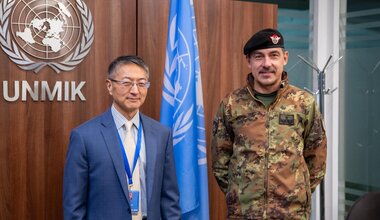Security and Gender Group (SGG) urges the government to adopt measures to address the economic effects of the COVID-19 pandemic
Security and Gender Group (SGG) urges the government to adopt measures to address the economic effects of the COVID-19 pandemic on women and girls
The economic impact of the COVID-19 pandemic across the globe will be profound, as it brings the world economy towards a recession. Emerging evidence on the impact of COVID-19 suggests that women’s economic and productive lives will be affected disproportionately and differently from men. Across the globe, as in Kosovo, women earn less, save less, hold less secure jobs, and are more likely to be employed in the informal sector. They have less access to social protection and represent the majority of single parent households. Their capacity to absorb economic shocks is therefore lower than that of men.
In Kosovo, as a result of the temporary closure of many economic activities, women, who bear the majority of the burden of care responsibilities and housework, are more exposed to the violation of their rights. Approximately 30% of women employed in the private sector in Kosovo work informally, and are unable to benefit from social security support, and are more likely to experience financial distress.[1] Moreover, they are often unable to adopt appropriate preventive health measures due to less economic means, leading to a greater risk of COVID-19 exposure. Women self-employed in family businesses and performing essential activities, such as retail, and pharmaceutical, health and social work, face similar risks.[2]Exacerbated burdens of unpaid care work on women and girls have also been identified in Kosovo, where care responsibilities are frequently placed onto women and girls, who bear the main responsibility for caring for ill family members and the elderly. The closure of schools further aggravates such burdens on women and girls, who absorb the additional responsibility of caring for children.[3]
Everything we do during and after the COVID-19 crisis must be in service of building more equal, inclusive and sustainable economies and societies. This necessarily includes gender responsive economic and social policies and placing women’s economic lives at the heart of the pandemic response and recovery plans. It is important that the Government in Kosovo incorporates sex disaggregated data and a gender lens targeting women and girls specifically.
Considering the specific economic situation of women, the Security and Gender Group addresses the Ministry of Economic Development and the Ministry of Finance, recommending the adoption of the following measures:
· Integrate a gender lens across all government assessments to understand the impact of COVID-19 on women and girls, including economic impact, and how to address it effectively; Containment and mitigation measures should also address the burden of unpaid care work and heightened gender-based violence (GBV) risks;
· Ensure the meaningful participation of women in all decision-making processes related to response mechanisms dealing with the socio-economic effects of COVID-19, and the development of such programs and policies;
· Access to benefits such as health insurance, paid leave, parental leave, pensions and unemployment benefits need to reach beyond formal employment and be accessible to women in all spheres of work;
· Financial support needs to target hard-hit women-led enterprises and businesses with subsidized and government-backed loans, tax and social security payment deferrals and exemptions;
· Kosovo labor market participation programmes should immediately support and improve the access of the vulnerable categories of women such as long-term unemployed women, young women, women with disabilities, women coming from Roma, Ashkali, Egyptian and other non-majority communities, victims of human trafficking or domestic violence, victims of sexual abuse, survivors of conflict related sexual violence, and single mothers.
· Implement measures to support frontline health and social service care workers, who are mostly women, addressing their specific needs as caregivers;
· Ensure that women are able to get information on how to prevent and respond to the pandemic in ways and in languages that they can understand;
· Develop special measures for supporting the female-dominated service sectors such as services, retail, hospitality, education and tourism.
· Create a social-protection safety net that will support women specifically in their households, also stimulating financial packages targeting women producers, such as women in the agriculture sector and small businesses owners;
· Private sector financial support and access to credit should be equally available to both women and men. Special financial support to women business owners is recommended including 0% interest credit rate.
· Women in the informal economy need to be supported to access cash transfers or unemployment compensation, especially those who don’t have access to banking.
· Incentives to the Kosovo Chamber of Commerce to support women businesses by, e.g. offering vocational training programmes and prequalification.
Note to the press
The Security and Gender Group (SGG) is a multi-stakeholder group, chaired by UN Women. The following signatories are members of SGG and support this public statement:
International organizations: UN Women, UNFPA, UNHCR, UNICEF, UN-Habitat, IOM, EU Office/EUSR, OSCE Mission in Kosovo, EULEX, UN Mission in Kosovo.
Women’s organizations and NGOs:Kosovo Gender Studies Center, KIPRED.
Kosovo Institutions: Agency for Gender Equality.
[1] Kosovo’s Women Network. (2020). Addressing COVID-19 from a Gender Perspective: Recommendations to the Government of Kosovo. Retrieved April 9, 2020, https://womensnetwork.org/wp-content/uploads/2020/04/Addressing-COVID-19-from-a-Gender-Perspective_04_04_2020.pdf
[2] Ibid.
[3] Harman, Sophie (2015). Ebola, gender and conspicuously invisible women in global health governance. Third World Quarterly 37(3).
 UN
UN United Nations Peacekeeping
United Nations Peacekeeping




